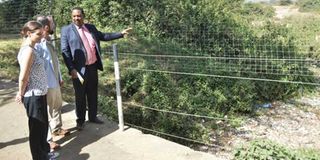World Bank to help clean up lakes Nakuru and Naivasha

Nakuru County Water and Sanitation Director Johnson Kamau (right) shows World Bank’s Sanitation Technical Assistance Mission effluent that drains into Lake Nakuru through River Njoro. The team is in Nakuru on a fact finding mission on ways to collaborate with the county government in addressing water supply, sanitation and hygiene challenges. PHOTO | SILA KIPLAGAT |NATION MEDIA GROUP
What you need to know:
- The teams visited Lake Nakuru, the home of flamingos, whose water has been contaminated with raw sewage.
- Continued pollution of the lake has led to massive migration of the flamingos.
- A recent study showed that key rivers flowing into Lake Nakuru are also contaminated with chang’aa and other dangerous chemicals.
The World Bank has embarked on an ambitious plan to clean up two lakes in Nakuru County that have been heavily polluted.
The institution, in collaboration with the Nakuru County government, wants to end continued pollution of lakes Nakuru and Naivasha.
Through its Sanitation Technical Assistance Mission, the bank also intends to sensitise residents living around the lakes on the importance of preserving the water bodies.
People neighbouring the lakes have been on the spot over pollution.
RAW SEWAGE
On Thursday, the teams visited Lake Nakuru, the home of flamingos, whose water has been contaminated with raw sewage and poisonous chemicals.
The lake is located within Lake Nakuru National Park, a major attraction site for international and domestic tourists.
Continued pollution of the lake has led to massive migration of the flamingos.
Governor Lee Kinyanjui has vowed to end pollution of the two lakes.
“The existence of these two lakes, in very proximity to towns with huge and growing populations, is a threat to the delicate ecosystem,” Governor Kinyanjui said.
The county is also involving stakeholders to ensure business and human activities conducted in and around the lake do not affect them.
The county is also seeking development partners and private investors to fund the expansion of the sewer system in Naivasha and Nakuru towns.
“We are also considering the establishment of an independent body to manage the two critical water resources [and also] Lake Elementaita,” the governor added.
NO CLEAN WATER
The county has in the past suffered from acute shortage of clean water and poor access to improved sanitation facilities.
Poor solid waste disposal, raw sewage effluent and poisonous chemicals have in the past been blamed for polluting the two lakes, which are key tourist attractions in the county.
The World Bank also intends to address the issue of sanitation in areas with poor hygiene that have led to flare-up of diseases especially among children and pregnant women.
A recent study showed that key rivers flowing into Lake Nakuru including River Ndarugu are also contaminated with chang’aa and other dangerous chemicals.
DUMPSITE
Nakuru’s main dumpsite at Gioto, which is 20 years old, has been blamed for the high levels of pollution in Lake Nakuru, posing an environmental hazard.
When it rains, waste laced with dangerous poisons from the dumpsite is normally washed into the Lake.
The collaboration between the county and the bank is an effort to find solutions to the sanitation challenges affecting the county.
The bank will offer financial and technical assistance through innovative approaches to pertinent issues with the help of the county government.
World Bank officials have already held a meeting with Governor Kinyanjui’s administration over the collaboration.
The World Bank team will tour 11 sub-counties in the next five days including the Gioto dumpsite.




